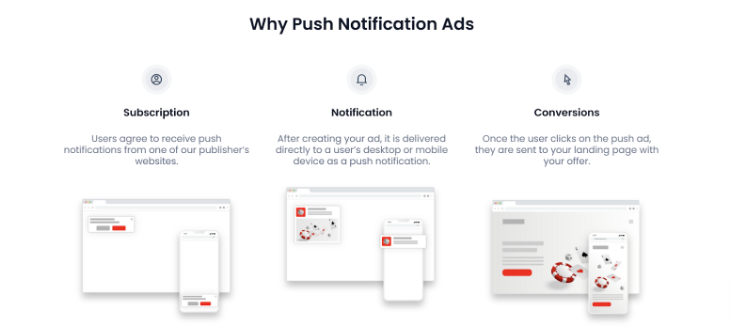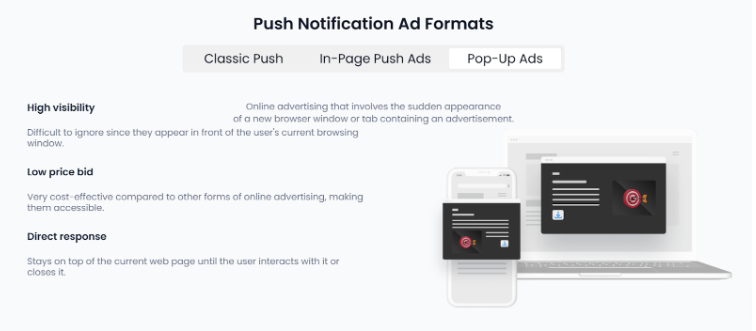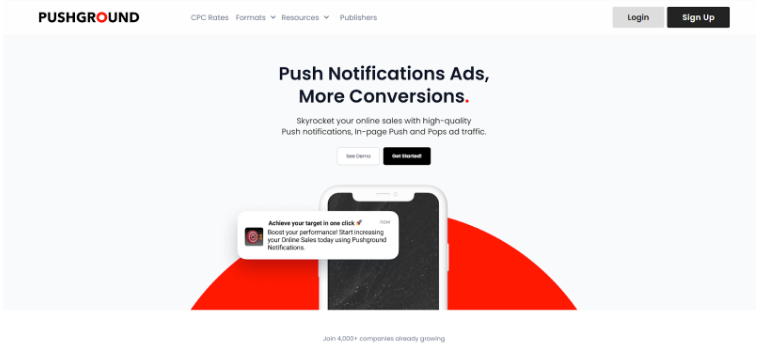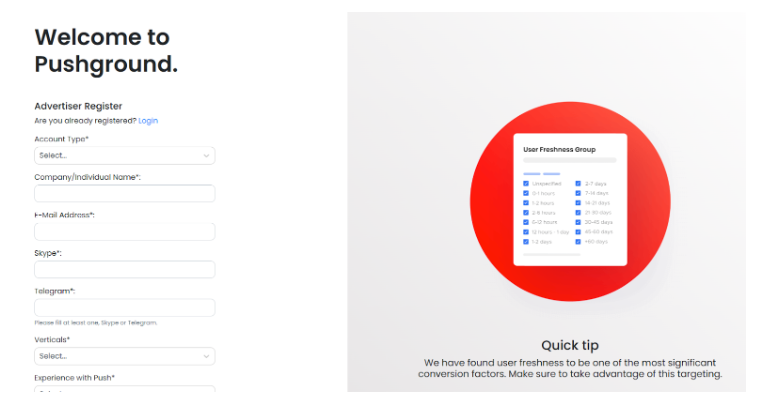PushGround Review 2025: Features, Formats, Pros & Cons

PushGround is a self-service advertising network providing comprehensive advertising solutions for ad agencies, marketers, and affiliates.
- Classic Push
- In-Page Push
- Pop-Up Ads
- #PushGround Key Features
- #PushGround Overview
- #PushGround Ad Types
- #PushGround CPC Rates
- #PushGround Push Campaigns
- #PushGround Testimonials
- Credit Card
- PayPal
- Wire Transfer
- Cryptocurrencies
Founded in 2018, PushGround has quickly become a go-to solution for advertisers seeking high-quality traffic and robust targeting options. With over 200 million real subscribers and a daily impression volume of 1.5 billion across 150+ countries, PushGround offers unparalleled reach for your campaigns.
In this review, we will explore PushGround’s key features, ad formats, pricing, pros and cons, and best practices.
Whether you’re a seasoned affiliate marketer or just getting started with push advertising, this guide will help you determine if PushGround is the right fit for your marketing goals.
PushGround Review: Key Highlights
Before we delve into the details, here’s a quick overview of PushGround’s core offerings:
| Feature | Details |
|---|---|
| Ad Formats | Classic Push, In-Page Push, Pop-Up Ads |
| Minimum Deposit | $100 ($200 for wire transfer) |
| Payment Methods | Credit Card, PayPal, Wire Transfer, Cryptocurrencies |
| Traffic Volume | 1.5 billion daily impressions |
| Geographic Reach | 150+ countries |
| Key Features | Real-time data, instant approval, A/B testing, auto-optimization, advanced targeting |
| Support | 24/7 customer service, dedicated account managers |
| URL | PushGround |
Who Is PushGround Best For?
In my experience, PushGround is an excellent choice for several types of advertisers:
- Affiliate marketers looking to promote offers in verticals like dating, crypto, mobile apps, and e-commerce
- Performance marketers seeking a high-volume traffic source with precise targeting options
- Brands aiming to re-engage users and drive conversions through non-intrusive push notifications
- Advertisers with shorter sales funnels or direct response offers
If you fall into any of these categories, PushGround could be a powerful addition to your marketing arsenal.
Pros And Cons Of PushGround
Like any advertising platform, PushGround has its strengths and weaknesses. Here’s my honest assessment based on personal use:
Pros Of PushGround
- Massive traffic volume and global reach
- Advanced targeting options for precise audience segmentation
- Real-time data and instant campaign approval
- User-friendly interface with intuitive campaign creation
- Competitive CPC rates, especially for Tier 2 and 3 countries
- Robust anti-fraud measures through Opticks integration
Cons Of PushGround
- Limited ad formats compared to some competitors
- Learning curve for optimizing push campaigns
- Higher competition and CPC rates for premium traffic
- No built-in tracking solution (third-party tracker required)
PushGround Overview
PushGround is a self-service push notification advertising network that connects advertisers with high-quality traffic sources across desktop and mobile devices. The platform stands out for its real-time bidding system, advanced targeting capabilities, and commitment to traffic quality.

During my campaigns, I was impressed by PushGround’s user-friendly interface and powerful optimization tools. The ability to launch campaigns instantly and access real-time performance data allowed me to iterate quickly and improve my results. While there’s definitely a learning curve, PushGround’s dedicated support team was always available to answer questions and provide optimization tips.
Key Features Of PushGround
PushGround offers a strong set of features designed to help advertisers maximize their campaign performance. Here are some standout capabilities I found particularly valuable:
- Real-time data aggregation: PushGround provides up-to-the-minute statistics on impressions, clicks, conversions, and other key metrics. This allowed me to quickly identify winning creatives and optimize my bids accordingly.
- Instant campaign approval: Unlike some networks that have lengthy review processes, PushGround approves campaigns almost immediately. This was a game-changer for time-sensitive offers.
- Advanced A/B testing: The platform supports testing up to 10 different ad variations simultaneously. I used this feature extensively to refine my messaging and visuals.
- Auto-optimization: PushGround’s intelligent algorithms can automatically redistribute budget from underperforming creatives to top performers. This saved me time and improved overall campaign efficiency.
- Granular targeting: I was able to target users based on factors like country, device, operating system, browser, and even time zone. This precision targeting helped boost my conversion rates.
- Anti-fraud protection: Integration with Opticks ensures that advertisers aren’t charged for fraudulent or bot traffic. I noticed significantly cleaner traffic compared to some other push networks I’ve used.
PushGround Ad Types
PushGround offers three main ad formats, each with its own strengths:

- Classic Push: These are traditional push notifications that appear on a user’s device, even when they’re not browsing. I found classic push ads particularly effective for time-sensitive offers and re-engagement campaigns.
- In-Page Push: These ads appear within a webpage, mimicking the look of a push notification. They’re a great option for reaching users who haven’t opted in to receive push notifications. I saw strong performance with in-page push for content discovery and lead generation campaigns.
- Pop-Up Ads: While not a push format, PushGround also offers pop-up ads that appear in a new browser window. I used these sparingly but found them effective for certain high-impact offers.
How To Get Started With PushGround
Getting up and running on PushGround is a straightforward process. Here’s a step-by-step guide based on my experience:
PushGround Requirements
- Valid email address
- Company name (if applicable)
- Payment method (credit card, PayPal, or funds for wire transfer)
- Ad creatives and landing pages ready to go
Steps To Get Started On PushGround
Here is a detailed step-by-step guide to get started with PushGround:
Step 1: Sign up for an account
Visit PushGround’s official website and click the “Sign Up” button. Fill out the registration form with your basic information.

Step 2: Complete your profile
Provide additional details about your business and advertising goals. This helps PushGround tailor their support to your needs.

Step 3: Fund your account
Add funds to your account using your preferred payment method. Remember, the minimum deposit is $100 ($200 for wire transfers).
Step 4: Create your first campaign
Click “Create Campaign” and follow the intuitive setup process. Choose your ad format, set targeting parameters, and upload your creatives.
Step 5: Set your budget and bids
Determine your daily budget and CPC bids. Start conservatively and adjust based on performance.
Step 6: Launch and monitor
Submit your campaign for approval (usually instant) and keep a close eye on performance metrics. Be prepared to optimize based on early results.
With these steps completed, you’ll be ready to tap into PushGround’s massive traffic potential and start driving results for your offers.
PushGround CPC Rates
CPC rates on PushGround vary widely depending on factors like country, device type, and competition. Based on my campaigns and PushGround’s published data, here are some average CPC rates for selected countries:
- United States: $0.10 – $0.25
- United Kingdom: $0.08 – $0.20
- Germany: $0.06 – $0.15
- India: $0.01 – $0.03
- Brazil: $0.01 – $0.04
Keep in mind that these are just averages, and you may need to bid higher for premium placements or during competitive periods.
Best Practices For Push Campaigns On PushGround
To maximize your success on PushGround, consider these best practices I’ve developed through trial and error:
- Craft compelling ad copy: Push notifications have limited space, so make every word count. Use action-oriented language and create a sense of urgency.
- Leverage dayparting: I found that scheduling ads to appear at specific times of day significantly improved engagement rates. Experiment to find the optimal times for your audience.
- Segment your audience: Take full advantage of PushGround’s targeting options. Create separate campaigns for different demographics, devices, or user behaviors.
- Continuously test and optimize: Don’t set and forget your campaigns. Regularly test new creatives, landing pages, and bidding strategies to improve performance over time.
Challenges And How PushGround Addresses Them
While PushGround offers many advantages, it’s not without its challenges. Here are some common issues and how the platform tackles them:
- Ad fatigue: Push notifications can become annoying if overused. PushGround addresses this by limiting the number of notifications a user receives to 3 per 24 hours.
- Fraud concerns: Invalid traffic is a persistent issue in digital advertising. PushGround’s integration with Opticks provides robust fraud detection and ensures advertisers aren’t charged for suspicious clicks.
- Competition for premium inventory: Top-performing placements can be highly competitive. PushGround’s real-time bidding system allows advertisers to adjust bids dynamically to win desired impressions.
My Experience With PushGround
As someone who’s experimented with various traffic sources, I found PushGround to be a refreshing addition to my marketing mix. The platform’s ease of use and powerful targeting capabilities allowed me to quickly launch and scale campaigns across multiple verticals.
One campaign that stands out was a mobile app promotion I ran targeting users in the United States. By leveraging PushGround’s device and OS targeting, I was able to reach Android users with high-intent creatives. The campaign achieved a 0.8% CTR and a positive ROI within the first week.
However, it wasn’t all smooth sailing. I initially struggled with finding the right balance between bid prices and traffic quality. It took some experimentation and guidance from my account manager to dial in the optimal settings for my offers.
PushGround Testimonials And Success Stories
Don’t just take my word for it. Here are some testimonials from other marketers who have found success with PushGround:
Is PushGround Worth It?
Based on my experience and the results I’ve seen, I believe PushGround is definitely worth considering for most digital marketers. The platform’s massive reach, advanced targeting options, and commitment to traffic quality make it a valuable tool for driving conversions and scaling campaigns.
However, success on PushGround requires a willingness to learn and optimize. It may not be the best fit for complete beginners or those unwilling to actively manage their campaigns. But for marketers ready to put in the effort, PushGround can be a highly effective addition to their advertising strategy.
PushGround Alternatives To Check Out
While PushGround is a strong contender in the push advertising space, it’s always wise to explore alternatives. Here are a few other platforms worth considering:
PropellerAds: Another major player in push advertising, PropellerAds, offers a wider range of ad formats beyond push notifications. It’s worth exploring if you want more diversity in your campaigns.
Link: Here
RichPush: Known for its high-quality traffic and advanced targeting options, RichPush is a good alternative if you’re looking for a more specialized push advertising platform.
Link: Here
Zeydoo: This network focuses on push notifications for mobile devices. Consider Zeydoo if mobile user acquisition is your primary goal.
Link: Here
Conclusion: Leverage The Power Of Push Advertising With PushGround
PushGround offers a compelling solution for advertisers looking to leverage the power of push notifications. With its massive reach, advanced targeting capabilities, and user-friendly interface, it’s a platform that can drive real results for your marketing campaigns.
While there’s certainly a learning curve, the potential rewards make PushGround worth the investment of time and resources. Whether you’re an affiliate marketer, brand advertiser, or performance marketing agency, PushGround provides the tools and traffic to take your campaigns to the next level.
Remember, success on any advertising platform requires testing, optimization, and a data-driven approach. Start small, learn from your initial campaigns, and don’t be afraid to lean on PushGround’s support team for guidance.